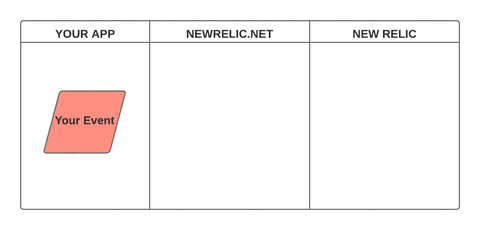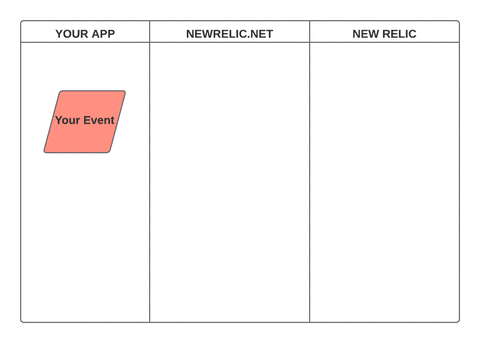A lightweight C# client for New Relic Insights
- Upload New Relic Insights events on-demand
- Upload in batches, as a scheduled task
- Minimal CPU usage (1 thread)
- Proxy-aware
Upload a Single Event
Create the Event
Create a class that implements NewRelicInsightsEvent:
public class CustomNewRelicInsightsEvent : NewRelicInsightsEvent
{
[JilDirective(Name = "name")]
public string Name { get; set; }
[JilDirective(Name = "count")]
public int Count { get; set; }
[JilDirective(Name = "unixTimeStamp")]
public int UnixTimeStamp =>
(int) DateTime.UtcNow
.Subtract(new DateTime(1970, 1, 1))
.TotalSeconds;
///
/// EventType is the New Relic Insights Event Grouping. It determines the
/// database to which the event will persist.
///
///
/// /// must be serialised
/// in Camel case, in order to be correctly interpreted by New Relic
/// Insights.
/// /// /// Apply the following attribute to the
///
/// property in your implementation:
/// /// /// [JilDirective(Name = "eventType")]
/// ///
[JilDirective(Name = "eventType")]
public string EventType { get; set; }
}
Note: NewRelic.NET leverages Jil for serialisation. Though JilDirective attributes are not required for custom properties, the EventType property requires the specified JilDirective.
Initialise New Relic Metadata
NewRelicInsightsClient.Instance.NewRelicInsightsMetadata.AccountID =
"{New Relic Account ID}";
NewRelicInsightsClient.Instance.NewRelicInsightsMetadata.APIKey =
"{New Relic API key}";
NewRelicInsightsClient.Instance.NewRelicInsightsMetadata.URI =
new Uri("https://insights-collector.newrelic.com/v1/accounts");
Upload the Event
var customNewRelicInsightsEvent = new CustomNewRelicInsightsEvent
{
Name = "TEST",
Count = id,
EventType = "Test"
};
Synchronously
NewRelicInsightsClient.Instance.UploadEvents(
new NewRelicInsightsEvent[]
{
customNewRelicInsightsEvent
},
new HttpClientFactory());
Asynchronously
NewRelicInsightsClient.Instance.UploadEventsAsync(
new NewRelicInsightsEvent[]
{
customNewRelicInsightsEvent
},
new HttpClientFactory());
Upload Events in Batches
Start the Event Cache
if (!NewRelicInsightsClient.Instance.HasStarted)
{
NewRelicInsightsClient.Instance.Initialise();
}
Add Events to the Cache
NewRelicInsightsClient.Instance
.AddNewRelicInsightEvent(customNewRelicInsightsEvent);
Event Upload Frequency
Batch-upload occurs every minute, by default, unless a custom frequency is specified. The following example sets the upload-frequency to 10 minutes:
NewRelicInsightsClient.Instance.RecurringTaskInterval = 10;
Proxy Server
The following example indicates that a proxy should be leveraged when invoking HTTP requests to New Relic:
NewRelicInsightsClient.Instance.NewRelicInsightsMetadata
.UseWebProxy = true;
NewRelicInsightsClient.Instance.NewRelicInsightsMetadata
.WebProxy = new WebProxy(“127.0.0.1:8080”);
Custom HTTP Timeout
Outbound HTTP requests to NewRelic are restricted to a specific timeout (5 seconds) as follows:
NewRelicInsightsClient.Instance.NewRelicInsightsMetadata
.UseNonDefaultTimeout = true;
NewRelicInsightsClient.Instance.NewRelicInsightsMetadata
.NonDefaultTimeout = new TimeSpan(0,0,5);
Otherwise, the default C# HttpClient-timeout applies.
Restricting Batch Upload Size
The default batch-upload size is 1,000 events. That is, a batch consisting of no more than 1,000 events will be uploaded upon each cache upload-cycle. The following example indicates that the entire cache should be emptied upon every upload-cycle:
NewRelicInsightsClient.Instance.NewRelicInsightsMetadata
.CacheUploadLimit = int.MaxValue;
Connect with me:


